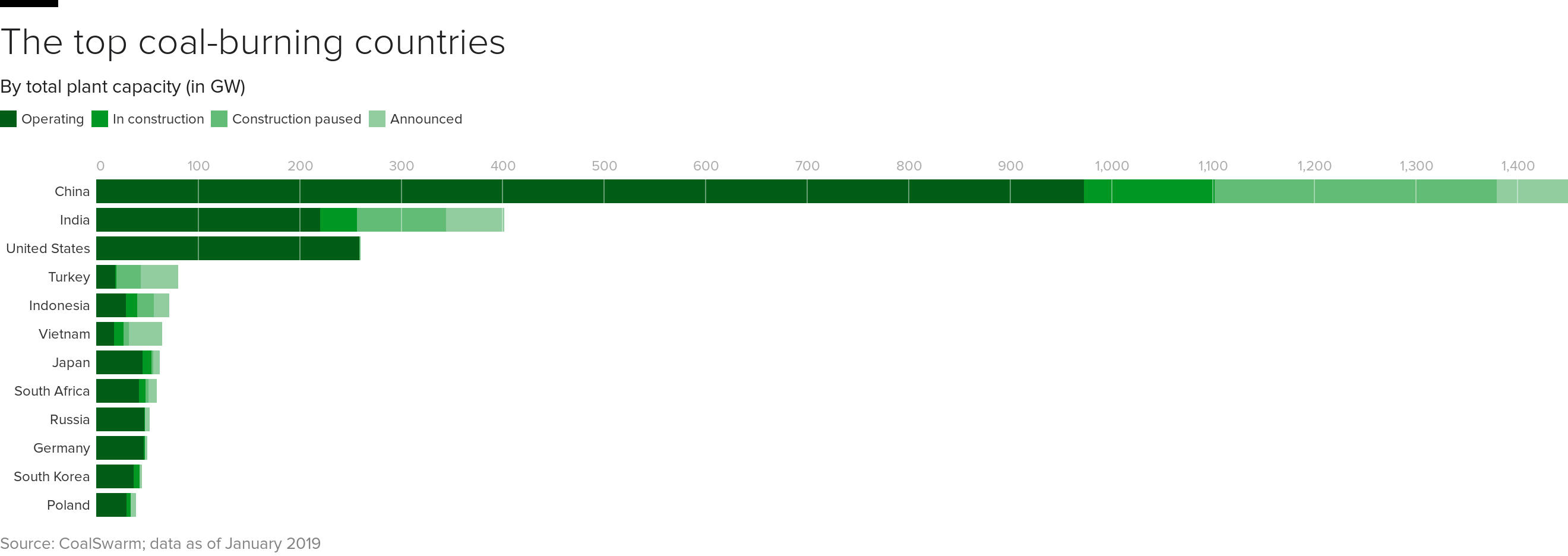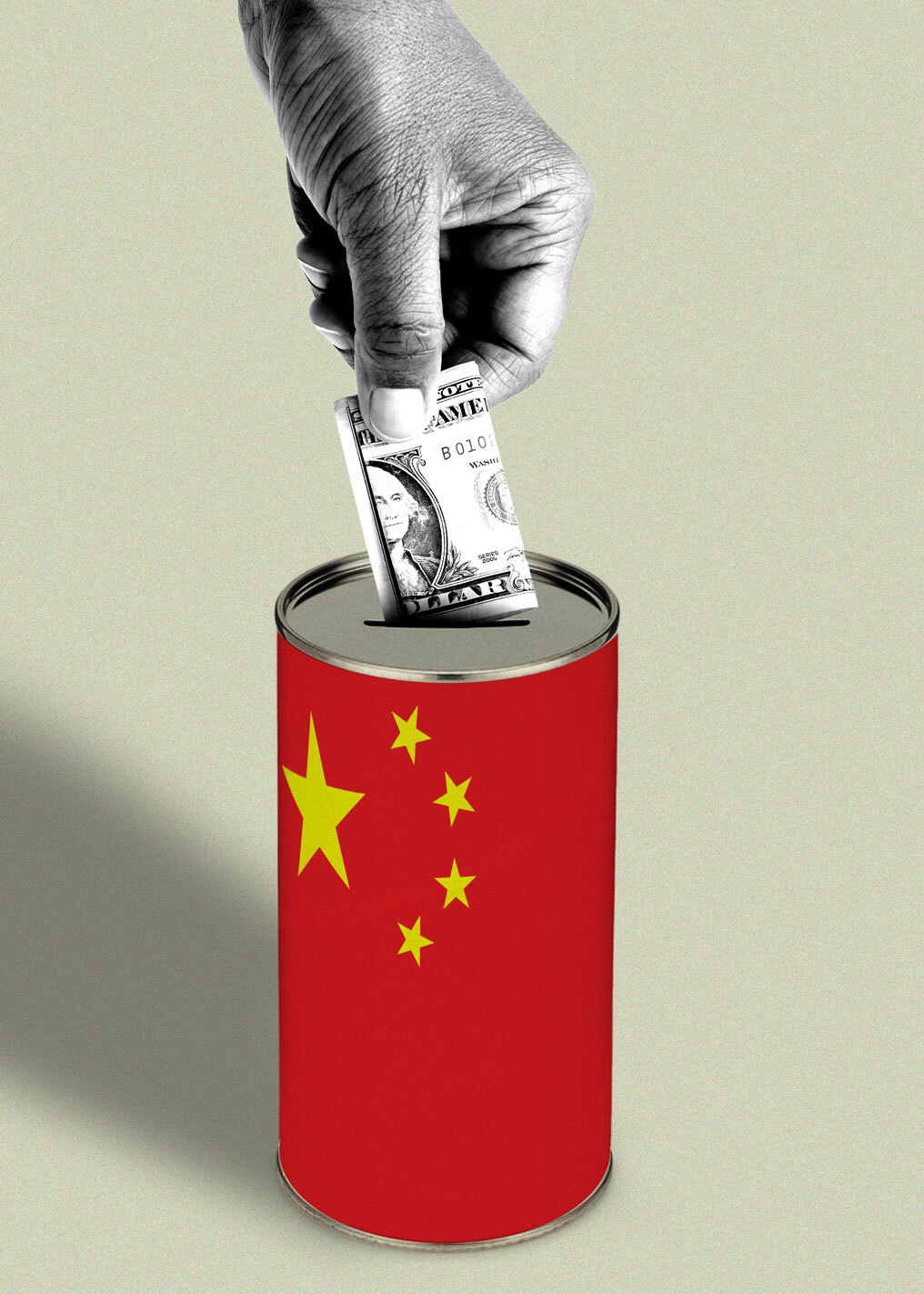Coal is a financial bust, but carbon emissions keep rising
- Although U.S. coal plants are becoming less profitable, global carbon emissions are higher than ever.
- China, the world's largest user of renewable energy, also burns the most coal.
- Coal is responsible for one-third of the global temperature increase since the Industrial Revolution.
- Three-quarters of U.S. coal capacity could be replaced with solar or wind resources within 35 miles of the closed plant, researchers found.
Although coal remains a potent political symbol in the U.S., as a profit-making enterprise the industry is running on fumes. Most of America's coal plants cost so much to run that they'd be cheaper to replace with renewable energy, according to a new analysis.
Utility-scale wind and solar power have been competitive with coal in different parts of the world for several years. But a report out this week from Energy Innovation shows just how inefficient coal plants have become as a way of delivering power. Three-quarters of U.S. coal capacity could be replaced with solar or wind resources within 35 miles of the closed plant, the research firm found. It predicts that, by 2050, 95 percent of America's existing coal fleet will be more costly than renewables.
Yet while the coal industry is struggling financially -- the U.S. led the world in retiring old coal plants last year -- coal as an energy source remains the main driver of carbon emissions, which rose to a new high last year. "As a result of higher energy consumption, CO2 emissions rose 1.7 percent last year and hit a new record," the International Energy Association announced this week.
Not covering the costs
Coal plants are particularly unprofitable in the U.S. because of the country's unique mix of energy resources. Cheap renewable technology and an abundance of natural gas, fueled by the "fracking" push, have driven down the cost of electricity.
As a result, coal plants "are putting a lot of power in the marketplace, and the price they're getting is cheaper than the price they need to cover the costs of the coal," said Geoffrey Heal, a professor of economics at Columbia Business School.
The dropping price of coal has driven eight U.S. coal companies into bankruptcy since 2015, including the three largest—Peabody Energy, Arch Coal and Cloud Peak Energy. Peabody, which is responsible for one-fifth of all U.S. coal extraction, reorganized and went public in 2017. It then saw its operating income drop the following year, even as the White House launched an aggressive pro-coal policy. Coal prices dropped further in 2018, leading Peabody to remind investors in its latest annual report that "the vast majority of third-party analysts project that prices are likely to decline."
Elsewhere, the dynamics are different. In Europe and Asia, natural gas costs double or triple what it does in the U.S. Unlike oil, gas is hard to transport long distances, so regional prices can vary a lot. Many foreign coal plants are also much more efficient than their U.S. counterparts, generating up to 30 percent more power from the same amount of coal.
"Most of the coal plants in the U.S. were built between 1950 and 1980," said Julio Friedmann, a senior research scholar at Columbia University's Center for Global Energy Policy. "But the U.S. doesn't make policy in other countries. You're not going to go to China and displace a coal plant with a solar farm or a wind farm."
The outgrowth of those economics is that China is both the world's largest user of coal and the largest developer and user of renewable power. The country last year added four times as much solar capacity as the U.S. did, but it also restarted work on 50 gigawatts of coal capacity (That's about one-fifth of the U.S.' current coal capacity.)
"You can accept the good news and the bad news simultaneously," said Friedmann. "It's possible to deploy a whole bunch of renewables and make a whole bunch of progress -- and still grow emissions. It's the difference between not gaining weight and losing weight."
The 30% problem
Newer coal plants may be more efficient, but they're still not efficient enough. For the first time, the International Energy Agency recently analyzed the contribution of various fuels to global warming. A key finding: Carbon dioxide from burning coal is responsible for 30 percent of the average temperature increase the world has seen since the Industrial Revolution.
"This makes coal the single largest source of global temperature increase," the agency said.
Here's another way to think of it: To keep global temperatures from rising less than 2 degrees -- a threshold scientists say is vital to forestall the most catastrophic effects of climate change -- virtually all coal plants need to be phased out quickly. And total emissions from all sources need to drop by up to one-half.
India, which is seeing a boom in solar installations after gorging on coal plants less than 10 years ago, illustrates the problem. The country experienced a boom in coal-plant permits about a decade ago before rapid development of solar made many of those plans obsolete. (One-third are currently more expensive than renewables, according to a recent analysis.)
Given how expensive coal plants are to build, they can take decades just to break even for their owners—even as they spew climate-changing emissions, not to mention toxic ash and other pollutants. It's harder to shut down a plant that was built just 10 years ago, even if there is a much cheaper option.
"It's not something where you can very lightly, in five years, say, 'This was a bad idea.' The plant life is 40 years," said Gregory Reed, director of the Center for Energy at the University of Pittsburgh. "I worry about the long-term impact from these short-term decisions."




